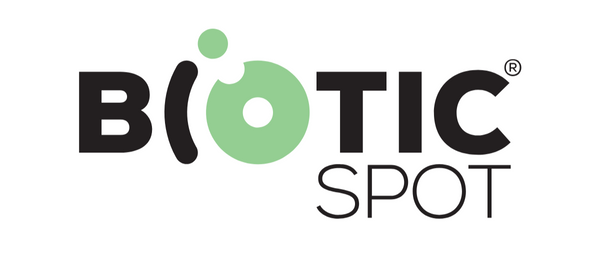
Prebiotics: The Complete Guide to a Healthy Microbiome
Share
You've probably heard more and more about the importance of gut health, about the microbiome as our "second brain." At the center of this inner universe is an army of beneficial bacteria that work tirelessly for our well-being. But for this army to function at its peak, it needs the right fuel. This is where prebiotics come in.
At BioticSpot.ro, we believe that understanding how our bodies work is the first step to a healthy life. That's why we've created this complete guide to help you understand what prebiotics are, how they can help you, and how you can integrate them into your daily life.
What exactly are Prebiotics?
In short, prebiotics are a special type of dietary fiber that serves as food (fuel) for the beneficial bacteria (probiotics) in your gut.
Unlike other foods, our bodies cannot digest these fibers. They pass through the upper digestive tract intact and reach the colon, where they become a feast for the intestinal flora. By fermenting these fibers, good bacteria produce valuable compounds, such as short-chain fatty acids (SCFAs), which have countless health benefits.
Key Difference: Prebiotics vs. Probiotics
It is one of the most common confusions, but the distinction is simple and essential:
Probiotics: These are live, beneficial bacteria. You can think of them as the "seeds" you plant in your gut garden.
Prebiotics: They are the food for these bacteria. They are the "fertilizer" that helps the seeds grow and thrive.
For a truly healthy microbiome, you need both. There's no point in bringing in new bacteria (probiotics) if you don't provide them with the environment and food they need to survive and multiply (prebiotics).
Proven Health Benefits of Prebiotics
By selectively feeding beneficial bacteria, prebiotics trigger a cascade of positive effects in the body. Here are the most important benefits, supported by scientific research:
- Improved Digestive Health: This is the most well-known benefit. Regular consumption of prebiotics helps balance intestinal flora, can reduce symptoms of bloating and constipation, and supports regular bowel movements.
- Immune System Support: Approximately 70% of our immune system is located in the gut. A healthy microbiome, nourished with prebiotics, contributes to a stronger and more balanced immune response.
- Improved Mineral Absorption: Certain prebiotics, such as inulin, have been shown to increase the absorption of essential minerals, such as calcium and magnesium, contributing to bone health. (Source: [Link to a relevant study on PubMed or a medical publication]).
- Blood Sugar and Weight Control: As fibers, prebiotics slow down digestion and can contribute to a prolonged feeling of satiety. This helps to better control appetite and maintain stable blood sugar levels.
Top Natural Sources of Prebiotics
You can increase your prebiotic intake very easily by incorporating more of the following delicious foods into your diet:
- Chicory root: It is the richest natural source of inulin.
- Garlic and onions: In addition to their multiple benefits, they are an excellent source of prebiotics.
- Asparagus
- Bananas (especially the greenest ones)
- Whole oats
- Artichoke
- Leek
- Apples
When Are Prebiotic Supplements Recommended?
Although a balanced diet is fundamental, there are situations where a concentrated prebiotic supplement can provide valuable support:
Low Fiber Diet: If your busy lifestyle does not allow you to constantly consume fresh vegetables and fruits.
After Antibiotic Treatments: Antibiotics kill both bad and good bacteria. A prebiotic supplement helps to quickly restore beneficial flora.
For Specific Digestive Support: If you are experiencing recurring digestive discomfort.
At BioticSpot, we have selected a range of digestive supplements containing high-quality prebiotics, such as inulin or FOS (fructooligosaccharides), to give you the support you need.
Possible Side Effects and Recommendations
Because prebiotics activate fermentation in the colon, introducing them suddenly or in large amounts may lead to temporary discomfort, such as gas or bloating.
Our recommendation: Start with a small dose and gradually increase over a few days or weeks, allowing your digestive system to adjust. Make sure you drink enough water.
Frequently Asked Questions (FAQ)
1. Can I take prebiotics and probiotics together?
Absolutely! The combination is called a "synbiotic" and is considered extremely effective because it provides both the bacteria and their food at the same time.
2. How long does it take to see the effects of consuming prebiotics?
Effects can vary. Some people notice an improvement in transit within a few days, while long-term benefits, such as immune support, build over several weeks of regular consumption.
3. Can children take prebiotics?
Yes, prebiotics are generally safe for children and can help support their developing digestive and immune systems. However, it is important to follow the recommended dosages for their age.
Conclusion: Nourish Your Well-being from Within
Prebiotics aren't just another nutrition trend; they're a fundamental component of overall health. By including multiple sources of prebiotics in your diet, whether from foods or quality supplements, you're making a direct investment in the health of your microbiome and, by extension, your overall well-being.
Explore our product range and discover how you can actively support your digestive health.
